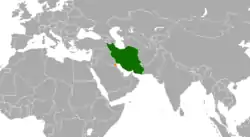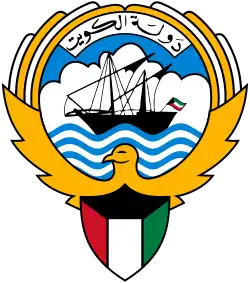Iran–Kuwait relations
Kuwait and Iran have longstanding historical ties spanning hundreds of years, particularly in the pre-oil era. Kuwait describes its relations with Iran as "excellent and historical".[3][4]
 | |
Iran |
Kuwait |
|---|---|
| Diplomatic mission | |
| Embassy of Kuwait, Tehran | Embassy of Iran, Kuwait |
| Envoy | |
| Ambassador Dr. Ali Reza Enayati[1] | Ambassador Majdi adh-Dhafiri[2] |
20th century
Historically, Kuwait had close political, economic, and cultural ties to Iran. However in the 1980s, Kuwait sided with Iraq during the Iran-Iraq War.[5] As for the result, Iranian–Kuwaiti relations were damaged and Iran had placed Kuwaiti ships, including tankers, under attack.[6] Kuwait's relations with Iran later improved when Iran denounced Iraq for invading Kuwait in the Gulf War at 1991.[7]
Recent history
Kuwait's plans for economic development, such as the "Silk City project", includes developing mutually beneficial economic ties with Iran (similar to Iran's current economic ties with Dubai of the United Arab Emirates).[8][5]
Despite American pressure on Kuwait's foreign policy, Kuwait continues to maintain friendly relations with Iran. Kuwait declined to follow Saudi Arabia's lead in severing diplomatic relations following the 2016 attack on the Saudi diplomatic missions in Iran.[5]
After U.S. President Donald Trump announced the United States withdrawal from the Iran nuclear deal, Kuwait opted to maintain formal ties with Iran[9] while Saudi Arabia, Bahrain, and the United Arab Emirates voiced strong support for the withdrawal.[5]
On March 26, 2022, Iran said that an agreement signed this week by Saudi Arabia and Kuwait to develop the Durra gas field was "illegal" since Tehran has a stake in the field and must be included in any move to operate and develop it.[10]
On April 13, 2022, Saudi Arabia and Kuwait invited Iran to conduct talks on Wednesday to define the eastern border of a combined, energy-rich offshore area, according to the Saudi state news agency SPA.[11]
Historical migrations
'Ajam of Kuwait (Persians of Kuwait)[12][13] are Kuwaiti citizens of Iranian origin, who migrated to Kuwait over the last couple of hundred years.[14][15][16] Historically, Persian ports provided most of Kuwait's economic needs.[15] Marafi Behbahani was one of the first merchants to settle in Kuwait in the 18th century.[17]
Most Shia Kuwaiti citizens are of Iranian ancestry.[18][19][20][21][22][23][24] However, many Kuwaitis of Iranian origin are Sunni Muslims such as the Al-Kandari and Awadhi families of Larestani ancestry.[25] Some Kuwaitis of Iranian Balochi origin are Sunni Muslim.[26][25] Balochi families first immigrated to Kuwait in the 19th century.[27]
The Persian sub-dialects of Larestani, Khonji, Bastaki and Gerashi have influenced the vocabulary of Kuwaiti Arabic.[28]
Further reading
- Rerouting the Persian Gulf: The Transnationalization of Iranian Migrant Networks, c.1900–1940
- The Shia Migration from Southwestern Iran to Kuwait: Push-Pull Factors during the Late Nineteenth and Early Twentieth Centuries
- Kuwait and Iran: Mutual Contact in the Pre-oil Era
- Between Modern and National Education: The ‘Ajam Schools of Bahrain and Kuwait
References
- "Archived copy". Archived from the original on 2015-01-20. Retrieved 2015-01-20.
{{cite web}}: CS1 maint: archived copy as title (link) - http://www.kuna.net.kw/ArticleDetails.aspx?id=2411024&Language=en
- "Kuwait's relations with Iran 'excellent, historic' Relations didn't weaken after the KSA-Iranian diplomatic ties were cut on January 2nd 2016". Kuwait News Agency.
- "Kuwait says relations with Iran are 'excellent'". The National. Archived from the original on 2021-02-11.
- Albloshi, Hamad H. (2018-05-24). "Kuwait's careful balancing act with Iran, Saudi Arabia". Al-Monitor. Retrieved 2018-07-28.
- https://scholarship.law.duke.edu/cgi/viewcontent.cgi?article=3026&context=dlj
- https://www.researchgate.net/publication/50211251_Iraqi_Invasion_of_Kuwait_as_Turning_Point_in_Iran-Saudi_Relationship
- Nader Habibi (4 June 2018). "The Foreign Policy Implications of Kuwait's Vision 2035: Closer Economic Ties with Iran and Iraq". Payvand.
- http://www.washingtontimes.com, The Washington Times. "Kuwait continues Iran straddle after Trump decision". The Washington Times. Retrieved 2018-07-28.
{{cite web}}: External link in|last= - "Iran says Saudi-Kuwaiti deal on Durra gas development 'illegal'". Reuters. Reuters. Reuters. 26 March 2022. Retrieved 10 April 2022.
- "Kuwait, Saudi Arabia invite Iran to hold talks on gas-rich offshore zone -SPA". Reuters. Reuters. Reuters. 13 April 2022. Retrieved 17 April 2022.
- Article in AL-AAN online newspaper Archived 15 April 2015 at the Wayback Machine (in Arabic) November 2010
- Article by Waleed aj-Jasim in Al-Watan daily newspaper Archived 15 April 2015 at the Wayback Machine (in Arabic). 25 May 2013
- "Policing Iranian Sanctions: Trade, Identity, and Smuggling Networks in the Arabian Gulf" (PDF). pp. 25–27.
- Peterson, John (2016). The Emergence of the Gulf States: Studies in Modern History. J. E. Peterson. p. 107. ISBN 9781472587626.
- Taqi, Hanan (2010). Two ethnicities, three generations: Phonological variation and change in Kuwait (PDF) (PhD). Newcastle University. Retrieved 5 December 2016.
- Mohammad E. Alhabib (2010). The Shia Migration from Southwestern Iran to Kuwait: Push-Pull Factors during the Late Nineteenth and Early Twentieth Centuries (Thesis). Georgia State University.
- Butenschon, Nils A.; Davis, Uri; Hassassian, Manuel (2000). Citizenship and the State in the Middle East: Approaches and Applications. Nils August Butenschøn, Uri Davis, Manuel Sarkis Hassassian. p. 190. ISBN 9780815628293.
- Binder, Leonard (1999). Ethnic Conflict and International Politics in the Middle East (PDF). p. 164. ISBN 9780813016870. Archived from the original on 8 December 2013.
Unlike the Shi'a of Saudi Arabia or Bahrain, the Kuwaiti Shi'a mostly are of Persian descent.
- Hertog, Steffen; Luciani, Giacomo; Valeri, Marc (2013). Business Politics in the Middle East. Rivka Azoulay. p. 71. ISBN 9781849042352.
- Ende, Werner; Steinbach, Udo (2002). Islam in the World Today: A Handbook of Politics, Religion, Culture, and Society. Werner Ende, Udo Steinbach. p. 533. ISBN 0801464897.
- Potter, Lawrence G. (June 2014). Sectarian Politics in the Persian Gulf. Lawrence G. Potter. p. 135. ISBN 9780190237967.
- Louër, Laurence (2011). Transnational Shia Politics: Religious and Political Networks in the Gulf. Laurence Louër. p. 47. ISBN 9781849042147.
- Dénes Gazsi. "The Persian Dialects of the Ajam in Kuwait" (PDF). The University of Iowa.
- Rivka Azoulay (2020). Kuwait and Al-Sabah: Tribal Politics and Power in an Oil State. p. 40. ISBN 9781838605063.
- "The Baluch Presence in the Persian Gulf" (PDF). 2013. pp. 742–743.
- The Shia Migration from Southwestern Iran to Kuwait: Push-Pull Factors during the Late Nineteenth and Early Twentieth Centuries. Georgia State University. 2012. pp. 71–72.
- Al-Tajir (2013). Lang & Linguistic in Bahrain Mon. Al-Tajir. p. 11. ISBN 9781136136269.

